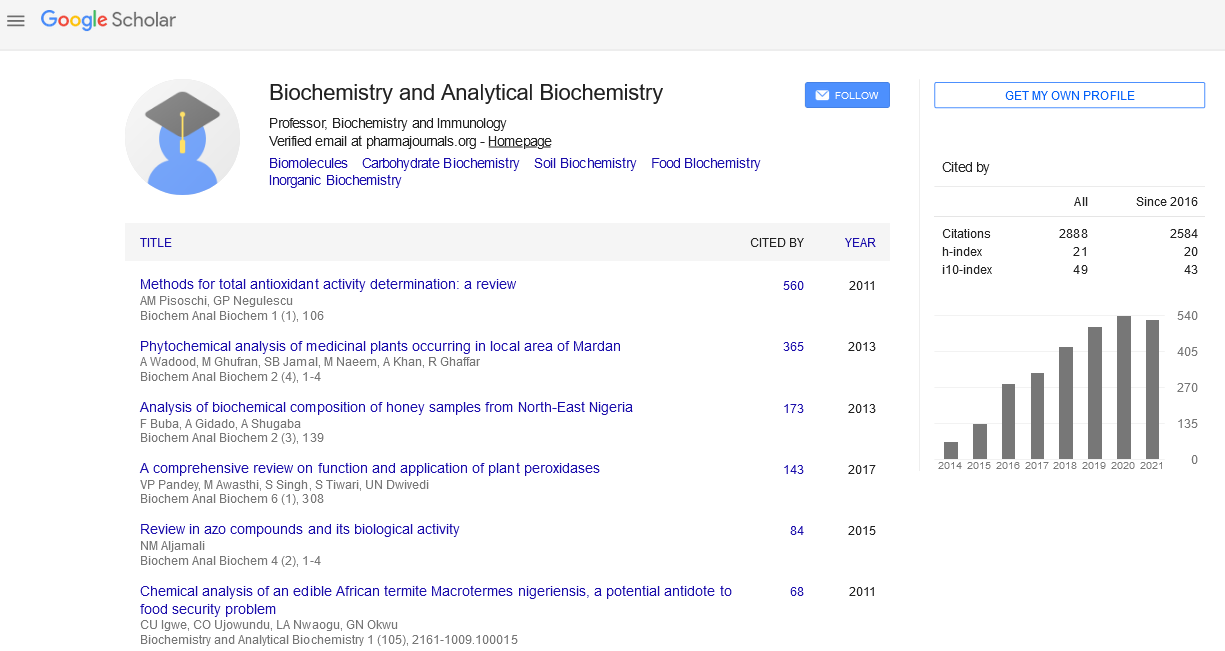Indexed In
- Open J Gate
- Genamics JournalSeek
- ResearchBible
- RefSeek
- Directory of Research Journal Indexing (DRJI)
- Hamdard University
- EBSCO A-Z
- OCLC- WorldCat
- Scholarsteer
- Publons
- MIAR
- Euro Pub
- Google Scholar
Useful Links
Share This Page
Journal Flyer

Open Access Journals
- Agri and Aquaculture
- Biochemistry
- Bioinformatics & Systems Biology
- Business & Management
- Chemistry
- Clinical Sciences
- Engineering
- Food & Nutrition
- General Science
- Genetics & Molecular Biology
- Immunology & Microbiology
- Medical Sciences
- Neuroscience & Psychology
- Nursing & Health Care
- Pharmaceutical Sciences
GTPase mutations change Septin 3 filament formation
2nd International Conference on Biochemistry
September 28-29, 2017 Dubai, UAE
Dolunay Kelle, Didem Baran, Burcu Sucu, Alp Tartici and Arzu Karabay
Istanbul Technical University, Turkey
Robert College, Turkey
Posters & Accepted Abstracts: Biochem Anal Biochem
Abstract:
Background: Septins are evolutionarily-conserved family of GTPase proteins that are required for cytokinesis in most eukaryotes and are increasingly recognized as a novel cytoskeletal component of due to their filamentous appearance, as well as their association with cellular membranes, actin filaments and microtubules. Our previous results indicated that Septin 3 and p60-katanin, which is an important enzyme with microtubule severing function, interact and p60-katanin has an effect on organization of Septin 3 filaments. Our aim in this research was to investigate how GTPase activity of the neuron-specific Septin 3 protein would affect Septin 3 filament formation and how modification of GTPase activity would change p60 katanin��? s activity on Septin 3 filaments. Material & Methods: In order to analyze Septin 3��?s GTPase activity, we chose to reduce the GTPase activity. Two critical amino acids which are revealed as important binding sites for GTP in Septin 3 GTPase domain, K208 and R280 were mutated in Septin 3 GTPase domain. We have generated three different Septin 3 constructs including K208A, R280A and both of the mutations. Then, we measured GTPase activity of these mutated Septin 3 constructs. Immunocytochemistry analysis was performed in wild type and mutated Septin 3 constructs expressing RFL6 (rat fibroblasts) cells to investigate the physiological effect of the GTPase mutations on the organization of Septin 3 filaments. Results: Our findings indicated that GTPase domain mutations decrease Septin 3��?s GTPase activity. Also, upon GTPase domain mutations, Septin 3 has shown punctuated formation instead of filament formation. Septin 3 and p60-katanin interaction was unaffected in the presence of GTPase activity mutations. Conclusions: These findings indicate that GTPase domain of Septin3 is important for filament formation. Although GTPase domain mutations affect GTPase activity and therefore Septin 3 filament formation, it has no effect on p-60-katanin and Septin 3 interaction.
Biography :
Dolunay Kelle has completed her Bachelor’s degree from Istanbul University, Molecular Biology and Genetics Department. She is currently pursuing her MSc degree and works at the molecular cell biology laboratory in Istanbul Technical University, Turkey.


